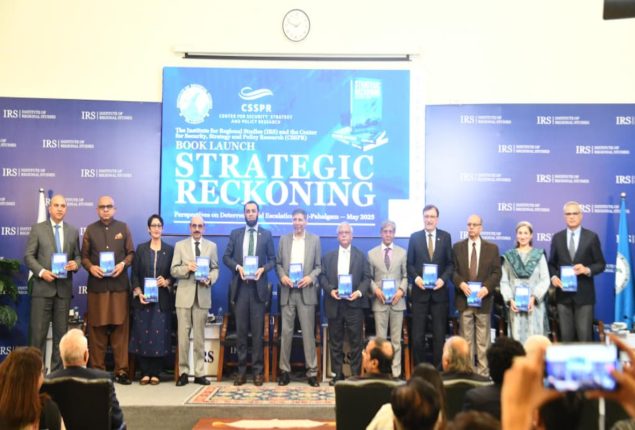

IRS-CSSPR launches landmark volume on Post-Pahalgam Deterrence and Escalation
The Institute of Regional Studies (IRS) in Islamabad, along with the Center for Security Strategy and Policy Research (CSSPR), has released a major edited book titled “Strategic Reckoning: Perspectives on Deterrence and Escalation Post-Pahalgam – May 2025.” The launch event was attended by diplomats, experts, academics, journalists, senior officials, and students.
The book, edited by Dr. Rabia Akhtar, offers a detailed study of the May 2025 crisis, seen as one of the most dangerous confrontations in South Asia in recent decades. It looks at the fragility of deterrence, the risks of rapid escalation, and how serious consequences were narrowly avoided. It shows how Pakistan, despite severe provocations, acted with restraint and carefully managed its responses to avoid further conflict. The work as a whole warns against normalizing unstable conflict dynamics.
Information Minister Ata Tarar, the chief guest, praised the book as an essential source for understanding the May 2025 clash between Pakistan and India. Ambassador Jauhar Saleem, President of IRS, criticized India’s coercive policies, saying they fuel instability in South Asia and weaken regional cooperation platforms like SAARC.
Lt. Gen. Khalid Ahmed Kidwai highlighted Pakistan’s strong tri-services readiness, its new Army Rocket Force Command, and its balanced military response that restored deterrence. Ambassador Masood Khan pointed to the Pahalgam attack as a flashpoint, stressing the importance of the Kashmir issue.

Dr. Rabia Akhtar described the crisis as India’s attempt to create a “new normal” of pre-emptive strikes, which she called a “new abnormal” under nuclear conditions. She stressed that Pakistan’s careful retaliation reflected responsible deterrence. Khalid Banuri praised the Pakistan Air Force for its quick mobilization, neutralizing Indian strikes, and demonstrating air superiority.
Dr. Salma Malik explained that such crises have wider regional effects, including economic disruption and security risks, and called for multilateral crisis management frameworks. Defense analyst Ejaz Haider criticized Indian media for sensationalism and propaganda, which fueled escalation and distorted realities.
The launch attracted a large and diverse audience, drawing wide interest from scholars, officials, and the general public.









